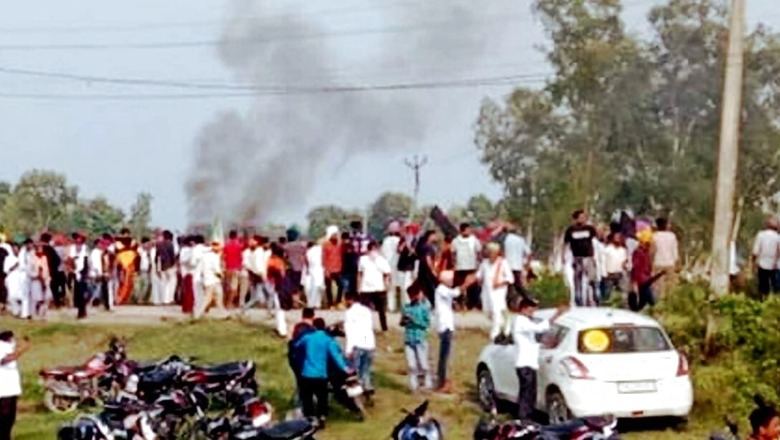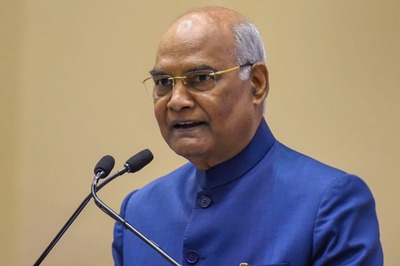
views
The initial fog surrounding the events in Lakhimpur Kheri in Uttar Pradesh is now lifting somewhat. It appears that a car was attacked by protesters. Eight people are reportedly dead, which includes four protesters, one driver, one mediaperson and two BJP workers lynched by an angry mob.
How did senseless violence of this sort come to pass? Because, for over a year now, we have allowed a group of highly entitled people to spread anarchy everywhere around the national capital region. If they want to seize a road, a railway or a highway, they can. If they want to destroy mobile phone towers, they can. No laws seem to apply to them. They dictate terms to the elected government and to the Supreme Court from the streets. And also to common people, who are being held hostage in traffic jams and stopped trains all across northern India.
The needs of common folk who are just trying to live their lives, does not seem to matter. The needs of businesses, limping back to normalcy after the devastating second wave, do not seem to matter. In fact, these protesters appear to be exempt from the pandemic itself because no Covid-19 restrictions have been applied to them in the past one year. The message is simple. If you are someone who is creating value and/or contributing to the economy, you do not matter. Because there is someone blocking your way, armed with a slogan and a song, and who fancies themselves as a revolutionary. This makes them better and more important than you are.
They call themselves farmers, or even ‘annadatas’, the latter with an even greater sense of entitlement. And therein lies the rub. Because anybody can see that they do not represent all farmers, nor the majority of farmers, not even a significant minority of farmers. The numbers make this obvious. Over half of all Indians depend on agriculture. If 600 million people had a problem with something, they would not need such guerrilla tactics, such as blocking this or that highway. They could bring the country to a halt within hours, and get whatever they wanted.
In other words, farmers do not need to call for Bharat Bandh because farmers are Bharat. The only reason these protesters are calling for Bharat Bandh and imposing it on others is precisely because they lack popular support.
So if not farmers, who do these people actually represent? It has been a year. There has been sufficient awareness around these new agricultural laws and saturation coverage in the media of the protests against them. If more people wanted to join, they certainly would have joined by now. The onus is now on the protesters themselves to prove that their agitation extends beyond a certain community based mostly out of one state.
This is where things get even more complex. Simply looking at the images, it is impossible to miss that these protests are coming from a particular religious demographic, not farmers. And that is exactly what many of the subversive elements lurking among the protesters want from us. They want India to open up old wounds and revive Sikh militancy. They are daring us openly with images of Bhrindanwale, as well as Khalistan supporters shuttling in and out of their new bases in Canada and Britain, provoking people.
This is a trap, and it is a well-thought out one. If we comment on the religious identity of the protesters, the subversive elements will use it to spread further anti-India sentiments within the community. If we do not, we have to refer to them as farmers, and treat them as if they represent everyone in India who depends on agriculture.
The provocation has been consistent, extreme and reached its height during the Red Fort incident on January 26. Which nation would allow its seat of power to be stormed thus and their flag insulted on the day that commemorates the founding of their republic? On that day, the so-called protesters chased policemen into a ditch with their big wheels. The violence in Lakhimpur is not likely to be the last.
This is a template that has been going around since the 2019 elections. First came Shaheen Bagh, then the Delhi riots, which the High Court now says were a pre-planned conspiracy. Now the so-called farmer protests. Pick up a cause and rule the country through the streets. Or more precisely, overrule the mandate on the streets.
An early version of this approach was tested as far back as October 2019, with the highly misguided movement to save ‘Aarey forest’ in Mumbai. As a result, the underground metro has been pushed back by at least four more years during which Mumbaikars will face traffic jams and spew millions of tons of carbon dioxide into the atmosphere. Instead, they could have had a cleaner, greener and more efficient public transportation system. But as long as you can write good protest poetry, who cares?
The roots of this lie within a group of people who think this country is not theirs any more, just because Narendra Modi won the 2019 elections. They have grappled with accusations of having a comfortable arrangement with the ruling class of 60 years, and living off the fat of the land. They cannot refute this allegation because it is so obviously true. They are grateful to suddenly have in their midst a handful of protesters with weather-beaten faces, which can help the liberal elite change their image.
And so they carry on, amplifying this so-called farmer movement, giving it legitimacy in media and on the academic circuit, using their connections in India and abroad. Just yesterday, there was a police baton charge against protesting farmers in Hanumangarh in Rajasthan. Were the farmers in Rajasthan not hardworking enough or not human enough? Perhaps the problem is that they were not useful enough to the narrative that liberals were looking for.
They made a career out of protesting against lynching, but today they cannot even acknowledge the BJP workers lynched by the mob in Lakhimpur. Also note that when there is a law and order situation in Uttar Pradesh, there are no strange excuses made. Such as the state having a history of political violence, which apparently works as an excuse for the chief ministers of Bengal or Kerala. They do not care about the fires they stoke, whether in Kashmir or in Punjab. Because they are willing to let this country burn to the ground if it helps to stop Prime Minister Modi.
Elections will come and go, but the nation remains. This nation is its people. We the people: farmers, workers, professionals, students, entrepreneurs; we just want to keep going. Let us pass. Do not assume that the highway is yours alone. Because it simply isn’t. Pick up the constitution and read.
(The views expressed in this article are those of the author and do not represent the stand of this publication.)
Read all the Latest News , Breaking News and IPL 2022 Live Updates here.




















Comments
0 comment